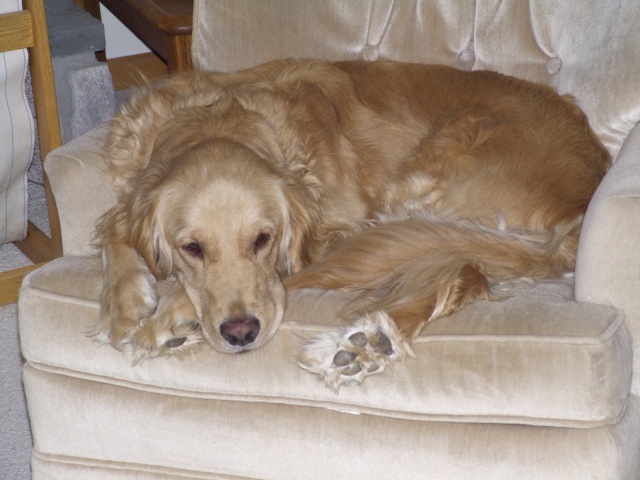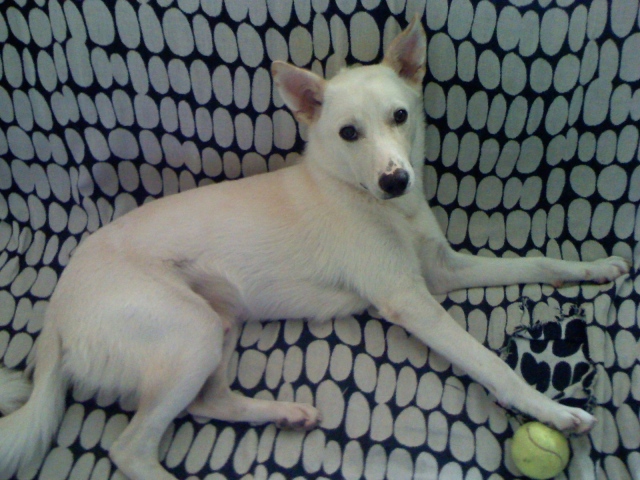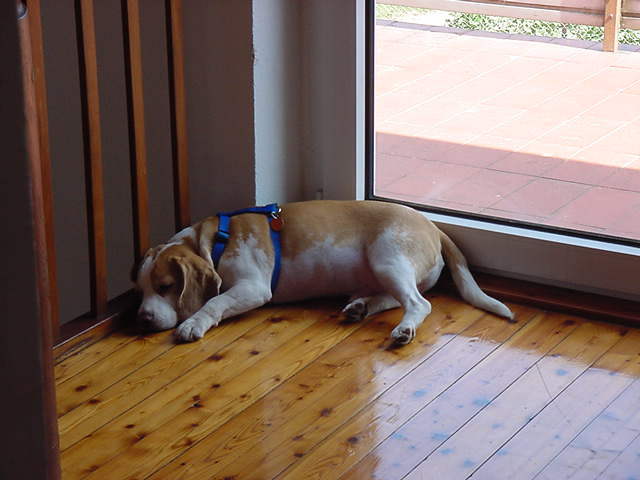QuestionMy girlfriend and I got Sherman about a year ago. He is an English/French Bulldog mix. He was about a year old when we adopted him. We got him from a family who said that they couldn't care for him anymore. The people that we got Sherman from saw him in the bed of the truck in a parking lot and felt bad for him. He was sunburned and they bought him that day. When we picked him up the people said that he chewed everything in their house and while they were at work they left him in a cage. Since Sherman has lived with us he has been an awesome dog and a great friend. He has never chewed any of our things and we have never had a single problem with him. He is very loved, well taken care of, and gets a ton of attention. We take him to the park or on walks about five times a week and he sleeps with me and my girlfriend. Our roommates have two other dogs, a lab and a cocker-spaniel and they get along great. Likewise, the roommates adore Sherman and treat him very well. About a week ago we were sitting at the dinner table and Sherman came over to me and sat underneath my chair. He started shaking and seemed scared. I went to the bathroom and he followed me and stayed in there for about a hour. A few days later he started shaking again and went and jumped in the bath tub. My girlfriend took him to the vet and they did a blood test and took x-rays to see if they could figure out what was wrong. The blood test came back negative and they said he seemed fine. The x-ray showed that his spine was crooked and he had bad discs. Also, they said some of his vertebrae were fused together. They gave us pain pills to give him, but the shaking and hiding have continued. We are very worried about him and would like to know what we can do to help him.
AnswerIt's impossible for me to answer this question: I can't interview you and your roommates/friends; I can't evaluate the dog in person; I can't observe his environment and evaluate the other dogs that live with you/him. A "crooked" spine could cause serious pain and there might be neurological damage: I can't see that, either. SOMETHING has caused this dog's apparent high anxiety/fear and panic but I CAN'T POSSIBLY determine what that is. I suggest you find a certified applied animal behaviorist who CAN do, in person, all the things necessary to form an opinion AND can also consult with your veterinarian. This dog may be developing (or responding to the development of) cognitive problems as the result of seizures, or pain, OR EVEN reaction to the pain medication. Find a certified applied animal behaviorist at one of the following sites:
http://certifiedanimalbehaviorist.com/page6.html
http://www.animalbehavior.org/ABSAppliedBehavior/caab-directory
Should this behaviorist be unable to identify cause, you will then need a veterinary behaviorist. These professionals DO NOT come into your home and CANNOT evaluate the relationships among your dogs nor do interviews with all humans in the household; they can merely hear your anecdotal information and evaluate the dog based upon that, along with veterinary records which you will obtain from your veterinarian:
http://www.veterinarybehaviorists.org/
http://www.avsabonline.org/avsabonline/
Meanwhile: do NOT attempt to "console" the dog if he presents with this behavior. Instead, redirect him: if he has a trained behavior to "sit", walk a few feet away, whistle or clap your hands until you have his attention, ask him to "sit" and reward with tiny food treat and praise. If this doesn't work, put him on leash: leash restraint calms a dog that's habituated to it. Once he's on leash and calmer, ask him to "sit", drop the leash, walk away and observe. If this is strictly behavioral, redirection will change his focus and slowly extinguish whatever motivation is involved (SLOWLY, may take days or weeks). If this is neurological or physiological, a temporary resolution may seem to appear but it will soon disintegrate. You really need in person evaluation, which I could be more help.

 aggression in aging dog
Question
Niko
I have a thirteen year old, female, Samoy
aggression in aging dog
Question
Niko
I have a thirteen year old, female, Samoy
 Dog walking problems
Question
Snickers
I have been trying to train my dog SN
Dog walking problems
Question
Snickers
I have been trying to train my dog SN
 Post bladder surgery potty training for INDOORS!
QuestionTiki
QUESTION: Dear Dr. Connor,
My 10 ye
Post bladder surgery potty training for INDOORS!
QuestionTiki
QUESTION: Dear Dr. Connor,
My 10 ye
 licking the floor not stop
QuestionGeorgie
QUESTION: Hi,
I have a 7 year ol
licking the floor not stop
QuestionGeorgie
QUESTION: Hi,
I have a 7 year ol
 Dog in Heat?
QuestionLily and Jorge
QUESTION: Hello,
We have
Dog in Heat?
QuestionLily and Jorge
QUESTION: Hello,
We have